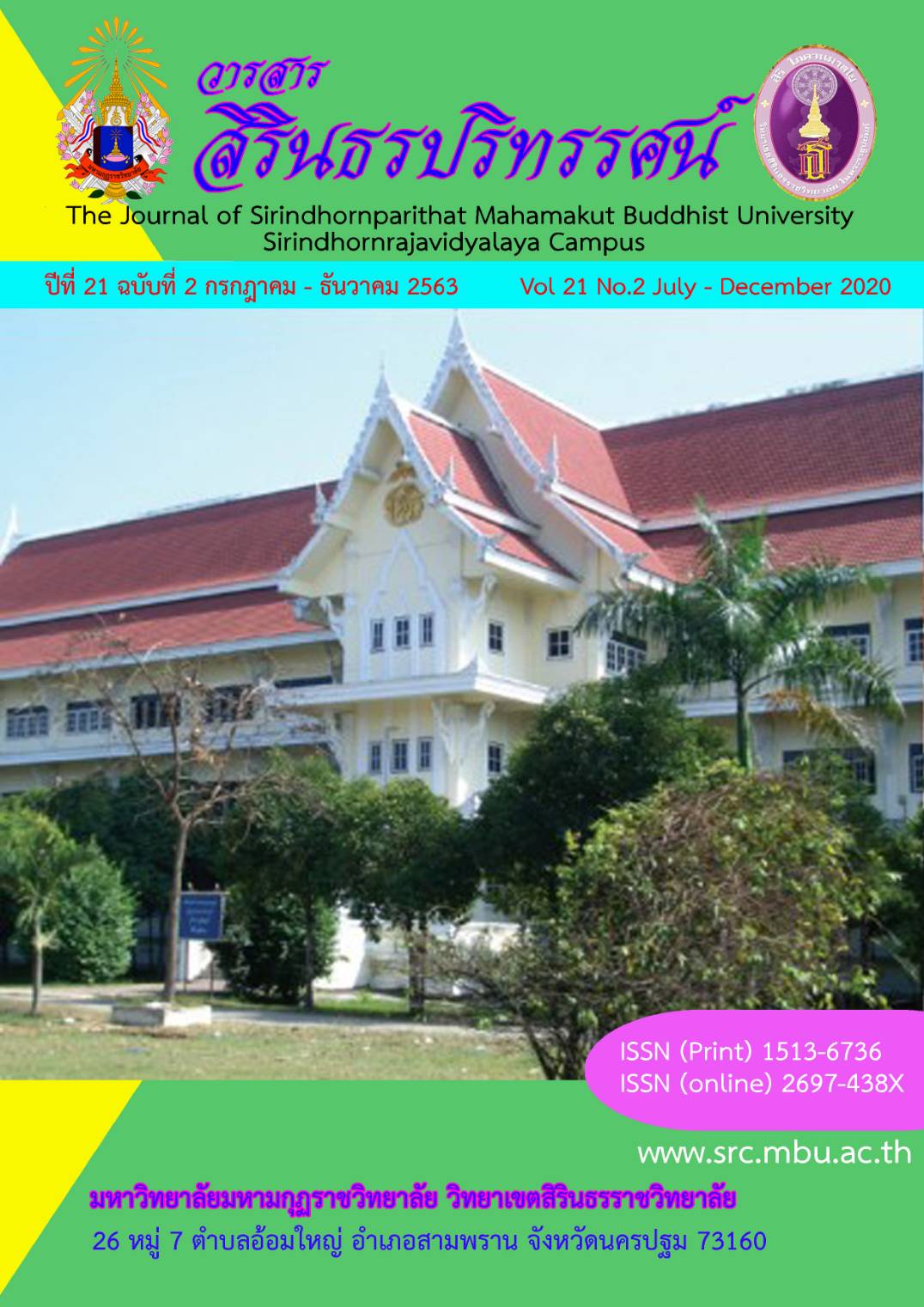Guidelines for Promoting Herbal Wisdom according to The King's Philosophy of Wat Klang Khu Wiang as a Lifelong Learning Resource
Keywords:
Promotion Guidelines, lifelong learning resource, Herbal wisdom, The King's Philosophy, Wat Klang Khu Wiang.Abstract
The research objectives were 1) to study the condition and needs for promoting herbal wisdom of Wat Klang Khu Wiang to be a lifelong learning resource, and 2) to propose guidelines for promoting herbal wisdom according to The King's Philosophy to be a lifelong learning resource. The sample group consisted of 1) 247 student of Non-Formal and In-Formal Education Center, Nakhon Chai Si Distric, Nakhon Pathom Province, in the Academic year 2018 and 370 elderly from 24 sub-districts in the Nakhonchaisri area, Nakhon Pathom Province. A total of samples were 617 people, and stratified random sampling was used to select the sample group, and 2) 9 people who were community stakeholders and purposive sampling was used in this study. A research questionnaire and a semi-structured interview were used as tools to collect data. Data were analyzed by mean, standard deviation and descriptive content analysis.
The results of the study were found that:
- The condition of the learning resource of Wat Klang Khu Wiang was in regression, with fewer users, and fewer Inherit knowledge. No learning activities are organized within the learning resources. Dissemination of information on social medias was not update. And it was also found that the needs to be a lifelong learning resource had a high level of demand on Knowledge, learning activities, and operational aspects.
- Guidelines for promoting herbal wisdom according to the King's Philosophy to be a lifelong learning resource were found that 1) community people should participate and strive in driving and continuing knowledge for future generations. 2) Relevant agencies should be united, and involved in organizing a variety of learning activities on the basis of sufficiency and non-profit. And there should be public relations of information through update and systematically medias, to promote it as a lifelong learning resource of the community.
References
พลอากาศตรีฐานัตถ์ จันทร์อำไพ. (2561). แนวทางการน้อมนำศาสตร์พระราชาสู่การพัฒนางาน ด้านกิจการพลเรือนของกองทัพอากาศ. กรุงเทพฯ : วิทยาลัยป้องกันราชอาณาจักร.
พัทธมน เอี่ยมสุองค์. (2552). แนวทางการพัฒนากระบวนการเรียนรู้ของกลุ่มเศรษฐกิจพอเพียง ตําบลป่าสัก อําเภอเมือง จังหวัดลําพูน. มหาวิทยาลัยเชียงใหม่.
พุทธชาด ลิ้มศิริเรืองไร. (2556). การศึกษาและพัฒนาป้ายและแผ่นพับประชาสัมพันธ์
สุนีย์ ภัทรเจียรพันธุ์. (2556). “การจัดการแหล่งเรียนรู้ภูมิปัญญาการทำบาตร : กรณีศึกษาร้านหัตถกรรม ไทยโบราณ”. สาขาวิชาการจัดการทรัพยากรวัฒนธรรม. บัณฑิตวิทยาลัย: มหาวิทยาลัยศิลปากร.
สุภามาศ อ่ำดวง. (2554). “แนวทางการจัดแหล่งเรียนรู้ในวัดเพื่อเสริมสร้างการเรียนรู้ตลอดชีวิต”. วิทยานิพนธ์ศึกษาศาสตรมหาบัณฑิต. คณะศึกษาศาสตร์: จุฬาลงกรณ์มหาวิทยาลัย.
โสภณ สุขสำอางค์. (2554). “แนวทางการพัฒนาการท่องเที่ยวเชิงศาสนาและวัฒนธรรม กรณีศึกษาตลาดน้ำวัดกลางคูเวียง ตำบลสัมปทวน อำเภอนครชัยศรี จังหวัดนครปฐม”. วิทยานิพนธ์บริหารธุรกิจมหาบัณฑิต สาขาวิชาการประกอบการ. บัณฑิตวิทยาลัย: มหาวิทยาลัยศิลปากร.
อมรรัตน์ อนันต์วราพงษ์. (2557). “รูปแบบการพัฒนาผลิตภัณฑ์ชุมชนบางหัวเสือจังหวัดสมุทรปราการตามแนวคิดพระราชดำริเศรษฐกิจพอเพียง”. วารสารศิลปกรรมศาสตร์วิชาการวิจัย. มหาวิทยาลัยเทคโนโลยีราชมงคลธัญบุรี.
อาชัญญา รัตนอุบล. (2551). การจัดการศึกษานอกระบบโรงเรียน. กรุงเทพฯ : คณะครุศาสตร์ จุฬาลงกรณ์มหาวิทยาลัย.
อุดม เชยกีวงศ์. (2551). การส่งเสริมการศึกษานอกระบบและการศึกษาตามอัธยาศัย การศึกษาที่ไม่จำกัดวัยและสถานที่. กรุงเทพฯ: แสงดาว
Wongthip, P. (2012). The applied for community development: concepts and integration. Bangkok: Strengthen Learning for the Blessed Community (Soros).
Best John W. (1981). Research in Education, 4thed. New Jersey: Prentice – Hall Inc.
Bloom, Benjamin S. (1971). Hand Book on Formative and Summative Evaluation of Student Learning. New York, Graw-Hill Book Company.
Downloads
Published
Issue
Section
License
บทความที่ได้รับการตีพิมพ์เป็นลิขสิทธิ์ของ มหาวิทยาลัยมหามกุฏราชวิทยาลัย วิทยาเขตสิรินธรราชวิทยาลัย
ข้อความที่ปรากฏในบทความแต่ละเรื่องในวารสารวิชาการเล่มนี้เป็นความคิดเห็นส่วนตัวของผู้เขียนแต่ละท่านไม่เกี่ยวข้องกับหาวิทยาลัยมหามกุฏราชวิทยาลัย วิทยาเขตสิรินธรราชวิทยาลัย และคณาจารย์ท่านอื่นๆในมหาวิทยาลัยฯ แต่อย่างใด ความรับผิดชอบองค์ประกอบทั้งหมดของบทความแต่ละเรื่องเป็นของผู้เขียนแต่ละท่าน หากมีความผิดพลาดใดๆ ผู้เขียนแต่ละท่านจะรับผิดชอบบทความของตนเองแต่ผู้เดียว




